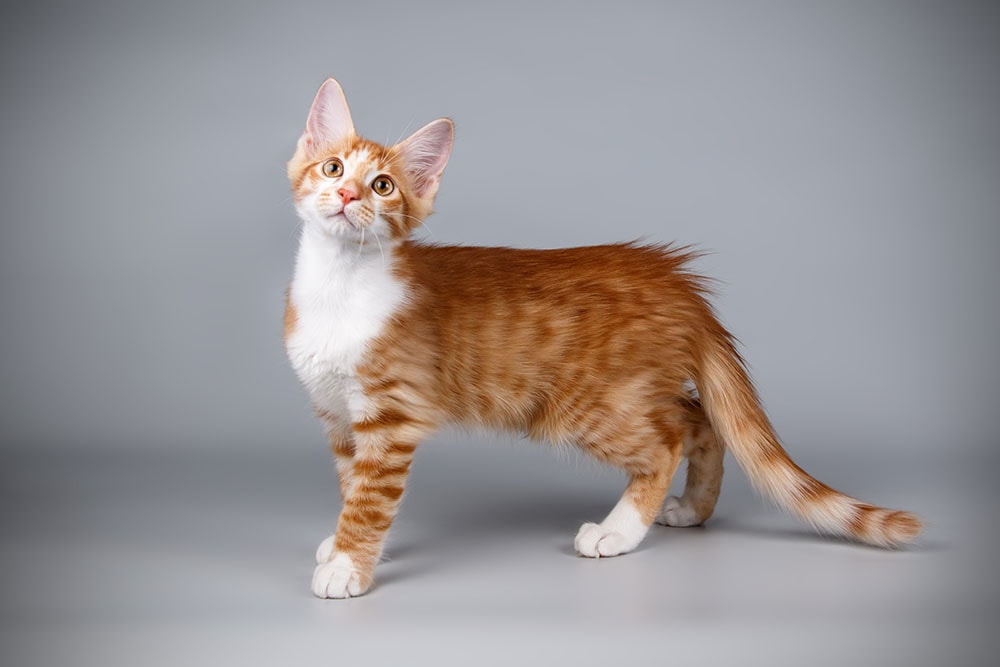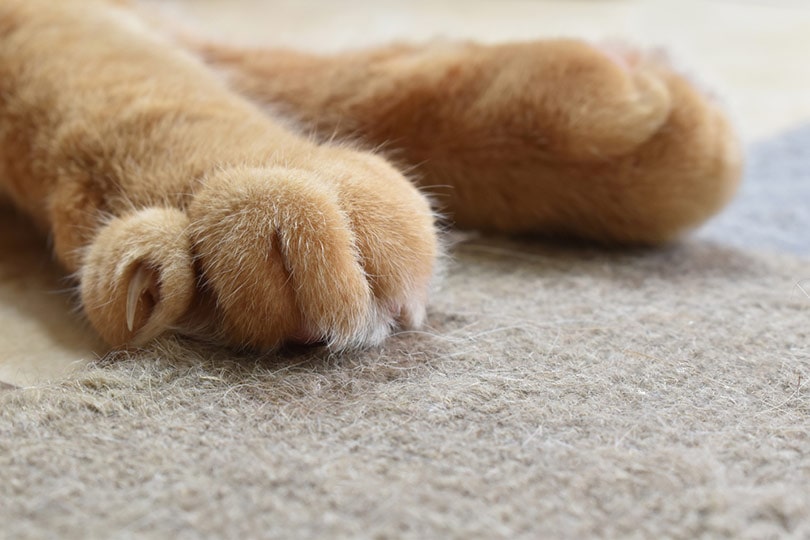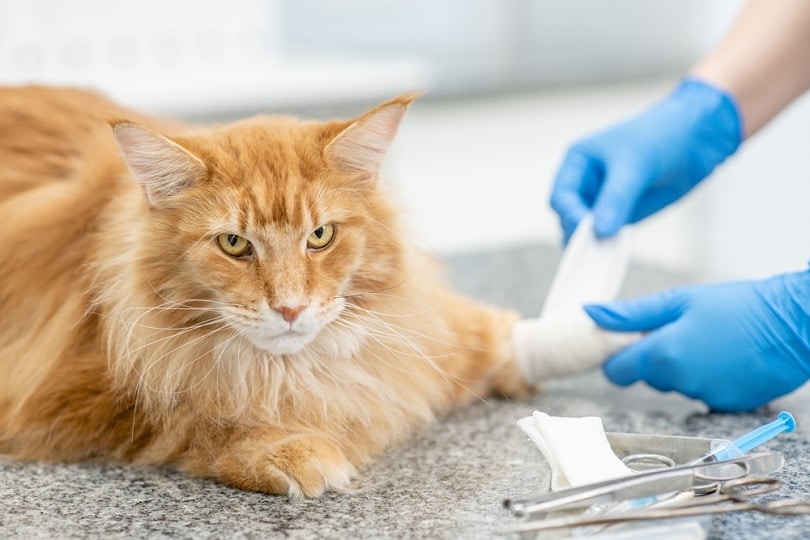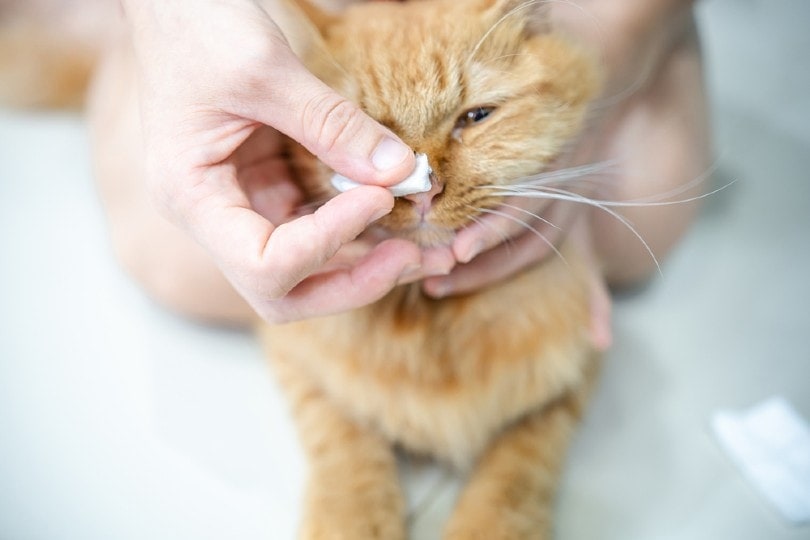Why Is My Cat Limping All of a Sudden? 7 Possible Reasons
By Lorre Luther
Updated on

As a cat lover, it’s always concerning to see your feline buddy having trouble walking or limping around in pain—cats are supposed to be able to jump on counters and knock over vases! It’s one of the reasons why we love them, after all.
There are several reasons a cat might be limping, from having a thorn stuck in their paw to outright trauma. Take your cat to the vet as soon as possible for a checkup if they come home after being outside and seem to have trouble getting around. Otherwise, you can probably wait a day or so before having your pet seen by a professional. Read on for a rundown on the possible reasons why your cat is limping all of a sudden.
 Cat Is Limping Suddenly? The 7 Likely Reasons Why
Cat Is Limping Suddenly? The 7 Likely Reasons Why
1. Foreign Objects
Kitties often experience trouble walking if something’s stuck in their foot pad or the delicate webbing between their toes. Cats have extremely sensitive paws; they’re actually filled with tons of nerves and operate as sense organs.
It’s why most cats don’t enjoy having their claws clipped or their paws petted! If a cat ends up with a thorn, splinter, or even a sharp bit of kitty litter stuck in their foot, it can make your cat uncomfortable to the point that they begin limping.
Thankfully, if your kitty’s paw pad isn’t infected or bleeding, you can most likely take care of the situation without heading to the veterinarian. Use tweezers to remove the sharp object and give your feline companion’s paw a good dousing with Betadine or Witch Hazel to keep it from getting infected.
2. Sore Paw Pads
Sometimes cats with sore paws will have trouble walking or try to avoid allowing a sensitive foot to come into contact with the ground. Kitties that have walked over hot sand or gravel often end up with sensitive paws. It’s the same sensation you get after sticking your hand under water that’s too hot for a few seconds.
Curious cats that manage to jump on a hot stove are also prone to the injury and often will limp for a few days as their wounds heal. Take a look at your pet’s paws if you see them limping after jumping on or walking across a hot surface to ensure everything’s OK. Confirm there is no active bleeding or oozing pus.

3. Ingrown Claw
If you’ve ever had an ingrown nail, you know just how painful this particular condition can be. Ingrown claws are painful, and they occur when a part of your cat’s claw curls back on itself and starts growing into the sensitive flesh around their paw pad.
Once the nail breaks the skin, things get even worse as your cat’s body begins sending infection-fighting white blood cells to the area. While on the one hand, this rush of white blood cells helps prevent infection, but it makes the area temporarily more painful by increasing the pressure. Ingrown claws aren’t the end of the world, but they need to be assessed by a veterinarian who has the tools to remove the ingrown nail and determine what antibiotics and anti-inflammatory medications are appropriate for your cat.
Overgrown nails can cause all kinds of problems for your cat's paws. Our Hepper Cat Nail Clipper Set includes everything you need to keep your cat's nails safely trimmed. It includes two sizes of stainless steel clippers complete with ergonomic handles and built-in safety guards. This set is perfect for all ages, sizes, and breeds of cats!
4. Injured or Infected Nail
Injured and infected claws can happen due to tearing or overaggressive nail trimming. Overgrown cat claws have a tendency to snag, often getting caught on carpet and trees. Some cats panic when this happens and essentially snatch the caught paw away with such force that they leave the claw behind. Kitties also end up with injured paws due to overzealous trimming that cuts down to the quick of the nail or further.
Both types of injuries are extremely painful and can easily result in infections which then increase your feline’s discomfort. While a run-of-the-mill injured nail may not a medical emergency, an infected nail will definitely need to be treated. Take your kitty to the veterinarian if you see any blood or pus coming from the site or your cat begins to show signs of illness.

5. Bites
Bug and animal bites can also cause your cat to limp due to a sensitive paw. If a bug or insect has bitten your cat’s paw, chances are you’ll notice swelling and oozing pus on your pet. Your cat will probably spend a fair amount of time licking the bite site to relieve the pain and reduce itchiness.
Outdoor cats that have been in a fight with a dog, cat, or another type of animal often have multiple scratch injuries and bite wounds, including on their paws. If you don’t know which animal inflicted the injury, you should contact your veterinarian immediately to discuss if rabies treatment is necessary, as the disease most often spreads to cats after they have come into contact with a wild animal infected with the virus.
6. Trauma
Cats can also injure their legs and have trouble walking due to trauma. The most common causes include being hit by a car, falling, and landing off balance after jumping.
These injuries tend to be serious and aren’t likely to resolve on their own. Any cat that has a close encounter with a car should be immediately treated by a veterinarian. The same goes for any cat that falls from a high perch.
Keep in mind that felines can injure their legs and even break their ribs during falls from just one or two stories. If your cat falls and appears to be having trouble breathing, contact your veterinarian for advice on safely transporting your feline companion to the hospital for immediate care.
7. Diseases
Certain diseases can cause cats to have trouble walking, including heart and neurological problems. Some cats with hypertrophic cardiomyopathy (HCM) have trouble with their back legs. The condition causes blood clots that interfere with your cat’s blood flow, often resulting in hindquarter lameness.
Older cats sometimes suffer from neurological diseases, including strokes that can create mobility issues. Arthritis itself can cause cats to limp, but that usually doesn’t present suddenly as it’s often a progressive disease that you can see getting worse over time. If there’s no injury to your cat’s paws or legs and there’s no chance they could be suffering from trauma, take your cat to the veterinarian for a check-up if the lameness doesn’t improve within 24 hours.
Summing Up
Cats have amazing paws! Not only are they adorable, but they also help your cat spring, jump, and knock things over. Full of sensitive nerves, your cat’s paws are an important part of how they maintain balance and move through the world with grace.
While not every paw injury calls for an emergency trip to the vet, it’s a cause for concern anytime you see your feline having trouble walking. If your cat regularly goes outside or escapes and comes home limping, take it to the veterinarian immediately for a thorough check-up!
Featured Image Credit: Oleksandr Volchanskyi, Shutterstock

 Cat Is Limping Suddenly? The 7 Likely Reasons Why
Cat Is Limping Suddenly? The 7 Likely Reasons Why










